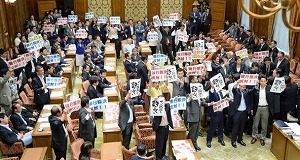|
.jpg)


Okada (center) speaks to reporters.



Opposition Diet members wave placards to protest against the forcible vote.
|
On July 15, the Abe administration disregarded the opposition of the DPJ and other opposition parties to end debate on the two pieces of government-sponsored security legislation in the House of Representatives Special Committee on Legislation for the Peace and Security of Japan and the International Community, and steamroller the bills through the Committee.
DPJ President Katsuya Okada gave his response on this to reporters later the same day, saying “We would like to express our strong opposition to the fact that this legislation, which represents a huge reversal of Japan’s national security policy and also is extremely likely to be unconstitutional, has been steamrollered [through the Committee.] With Prime Minister Abe himself admitting that ‘public understanding has not deepened’ was it really meaningful or necessary to hold a vote at this time? The government should withdraw the legislation and start discussions again from the beginning.”
Asked by a reporter, “How do you feel about the fact that you have ended up allowing the vote to take place?” Okada responded “I think rather that the way in which public opposition has increased as the debate has proceeded is in direct proportion to the efforts shown by my colleagues, particularly those from the DPJ, who have questioned the government in the Special Committee. Through such debate in the Special Committee the Japanese people have decided that ‘these bills are wrong.” He stressed, “Moving to a vote is clearly mistaken at this point in time. There is a limit to what we can do, but we have done whatever possible.”
Asked about the DPJ’s ongoing response, Okada said, “Of course this is not the end of the matter. Public opposition will only continue to strengthen during the lengthy Diet session. Under such circumstances, what matters is how we can create a situation under which the legislation cannot be enacted.”
Okada also commented on the possibility of a vote using the ’60 days rule’ [where legislation can be returned to House of Representatives after 60 days if a vote has not taken place in the House of Councillors, and can be approved with a two thirds majority of the House of Representatives.] He said, “From the point of view of members of the House of Councillors, including those belonging to the ruling parties, this would seem to be a move that disregards the meaning of the House of Councillors’ existence.”
In a plenary session of the House of Representatives held the following day, July 16, DPJ President Katsuya Okada took to the podium to argue against the legislation. Following this, members of the DPJ and other opposition parties left the chamber as voting was about to take place to express their disagreement [over the security legislation and the forcible vote itself].
|

